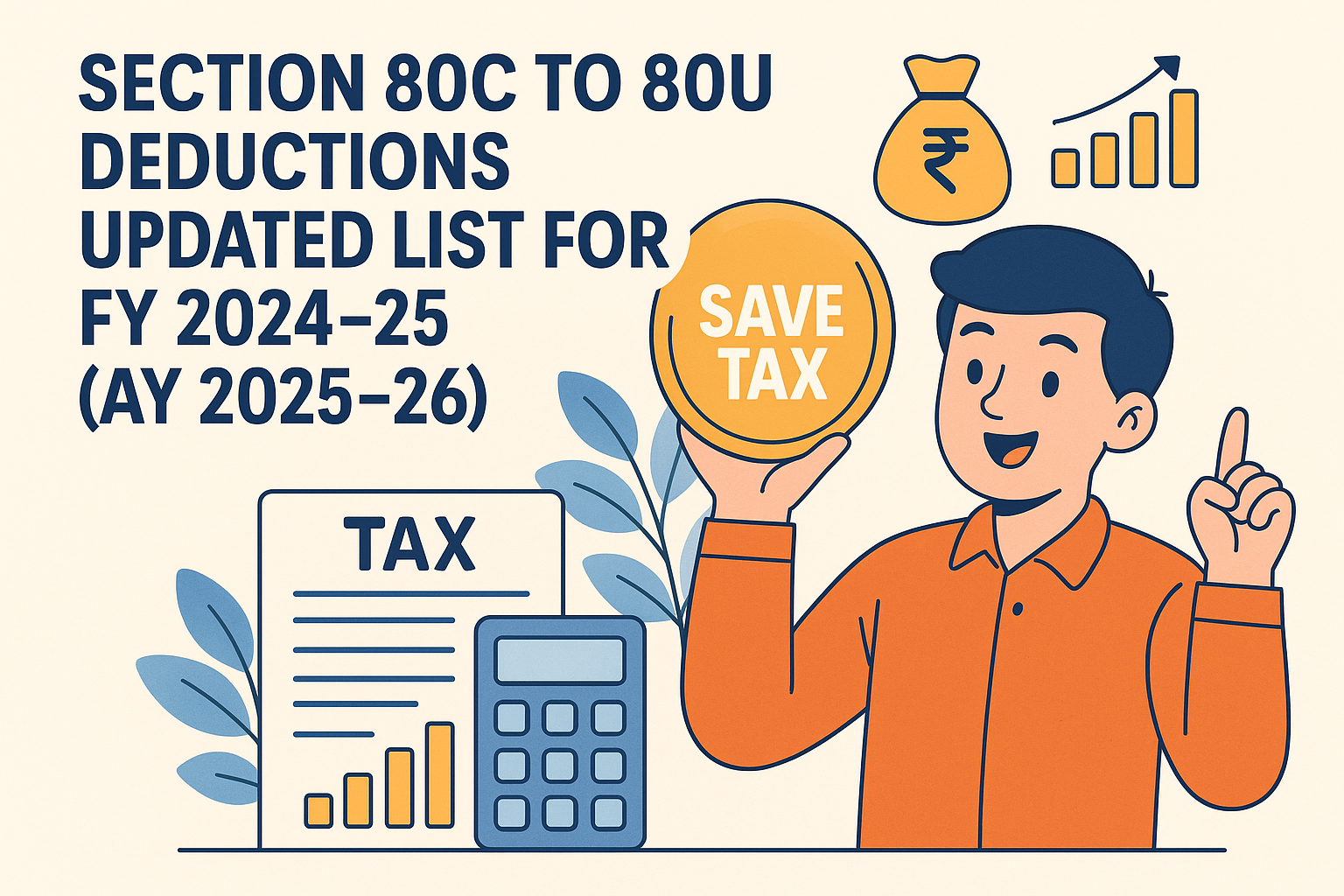Introduction
Saving tax is something every salaried person, businessman, or professional wants. The good news is – the Income Tax Act of India gives you various deductions from Section 80C to 80U to reduce your taxable income.
If you know how to use them smartly, you can save up to ₹1.5 lakh to ₹3 lakh or more in taxes legally.
This blog will explain all deductions under Section 80C to 80U in simple language, updated for FY 2024–25 (AY 2025–26).
Table of Contents
What are Tax Deductions?
Tax deductions are amounts you can subtract from your total income before calculating your tax. It helps in reducing your tax liability.
For example:
If your income is ₹10 lakh and you claim deductions of ₹2.5 lakh, you will pay tax on ₹7.5 lakh only.
List of All Deductions from Section 80C to 80U
Section 80C – Most Common Deduction (Limit ₹1.5 lakh)
You can claim up to ₹1,50,000 by investing in:
- LIC premium (for self, spouse, children)
- PPF (Public Provident Fund)
- EPF (Employee Provident Fund)
- NSC (National Savings Certificate)
- ELSS mutual funds (tax-saving)
- Home loan principal repayment
- Sukanya Samriddhi Yojana
- Children’s tuition fees
Note: Combined limit with 80CCC and 80CCD(1) is ₹1.5 lakh.
Section 80CCC – Pension Plan Contributions
Deduction for amount paid towards certain pension funds (like LIC Jeevan Akshay).
Limit is included in ₹1.5 lakh under 80C.
Section 80CCD(1) – NPS Contributions (Self)
For contribution to National Pension Scheme (NPS).
Up to 10% of salary (for employees) or 20% of gross income (for self-employed).
Part of overall ₹1.5 lakh 80C cap.
Section 80CCD(1B) – Extra ₹50,000 for NPS
This is over and above ₹1.5 lakh limit.
If you invest in NPS, claim extra ₹50,000 deduction.
Smart Tip: Claim full ₹2 lakh deduction (₹1.5L under 80C + ₹50K under 80CCD(1B))
Section 80D – Medical Insurance Premium
| Category | Limit |
|---|---|
| Self, Spouse, Children | ₹25,000 |
| Parents (Senior Citizens) | ₹50,000 |
| Own Self (Senior Citizen) | ₹50,000 |
Also includes ₹5,000 for preventive health checkup.
Section 80DD – Dependent with Disability
Expenses for treatment, rehab or LIC policy for disabled dependent.
Deduction:
- ₹75,000 (40% disability)
- ₹1,25,000 (80% or more)
Section 80DDB – Medical Treatment for Specified Diseases
For treatment of diseases like cancer, kidney failure, Parkinson’s, etc.
Limit:
- ₹40,000 (below 60 years)
- ₹1,00,000 (senior citizen)
Requires prescription from specialist in govt hospital.
Section 80E – Interest on Education Loan
For higher education (self, spouse, children).
No limit on amount, but allowed for 8 years only.
Section 80EE – Interest on Home Loan (First-Time Buyers)
Extra deduction of ₹50,000 on interest.
Home loan up to ₹35 lakh and property value below ₹50 lakh.
Section 80EEA – Affordable Housing Loan Interest
Extra ₹1.5 lakh deduction on interest (over Section 24b).
For loans sanctioned before 31 March 2022 (if continuing).
Section 80EEB – Electric Vehicle Loan Interest
Deduction up to ₹1.5 lakh on EV loan interest.
Loan should be taken between FY 2019–20 to FY 2023–24.
Section 80G – Donations
Deduction for donation to charity, PM CARES, NGOs, temples, etc.
Some are 100% allowed, others 50% with/without limit.
Keep donation receipt with PAN of organization.
Section 80GG – Rent Paid (No HRA)
For self-employed or salaried person not getting HRA.
Max deduction: ₹60,000/year (₹5,000/month)
Formula based: least of 3 values (actual rent, 10% income, fixed cap)
Section 80GGC – Donation to Political Parties
Full deduction for donations to registered political parties.
Must be paid in non-cash mode.
Section 80TTA – Savings Account Interest
Deduction up to ₹10,000 on interest earned in savings bank account.
Only for non-senior citizens.
Section 80TTB – Interest for Senior Citizens
Up to ₹50,000 deduction on FD and savings account interest.
Only for people above 60 years.
Section 80U – Deduction for Disabled Individuals
Applicable for self-disability (unlike 80DD for dependent).
Deduction:
- ₹75,000 (40% disability)
- ₹1,25,000 (80% or more)
Quick Summary Table
| Section | Purpose | Max Limit |
|---|---|---|
| 80C | LIC, PPF, ELSS, tuition, loan | ₹1,50,000 |
| 80CCD(1B) | NPS Extra Deduction | ₹50,000 |
| 80D | Mediclaim | ₹25,000–₹1,00,000 |
| 80E | Education Loan Interest | No Limit |
| 80G | Donations | Varies |
| 80TTA/TTB | Interest Income | ₹10,000 / ₹50,000 |
| 80U | Own Disability | ₹75,000 / ₹1,25,000 |
Important Tips
- Combine 80C + 80CCD(1B) + 80D + 80G to save more.
- Always keep proof (receipts, policies, medical bills, donation slips).
- File under Old Regime to claim these deductions (New Regime does not allow them).
Conclusion
Knowing these sections from 80C to 80U can help you and your family save big on taxes. You just need smart planning and timely investments.
Still confused which deductions apply to you?
Get help from experts at TaxGiveIndia.com – We file your ITR with AI-powered forms and CA assistance in minutes.
